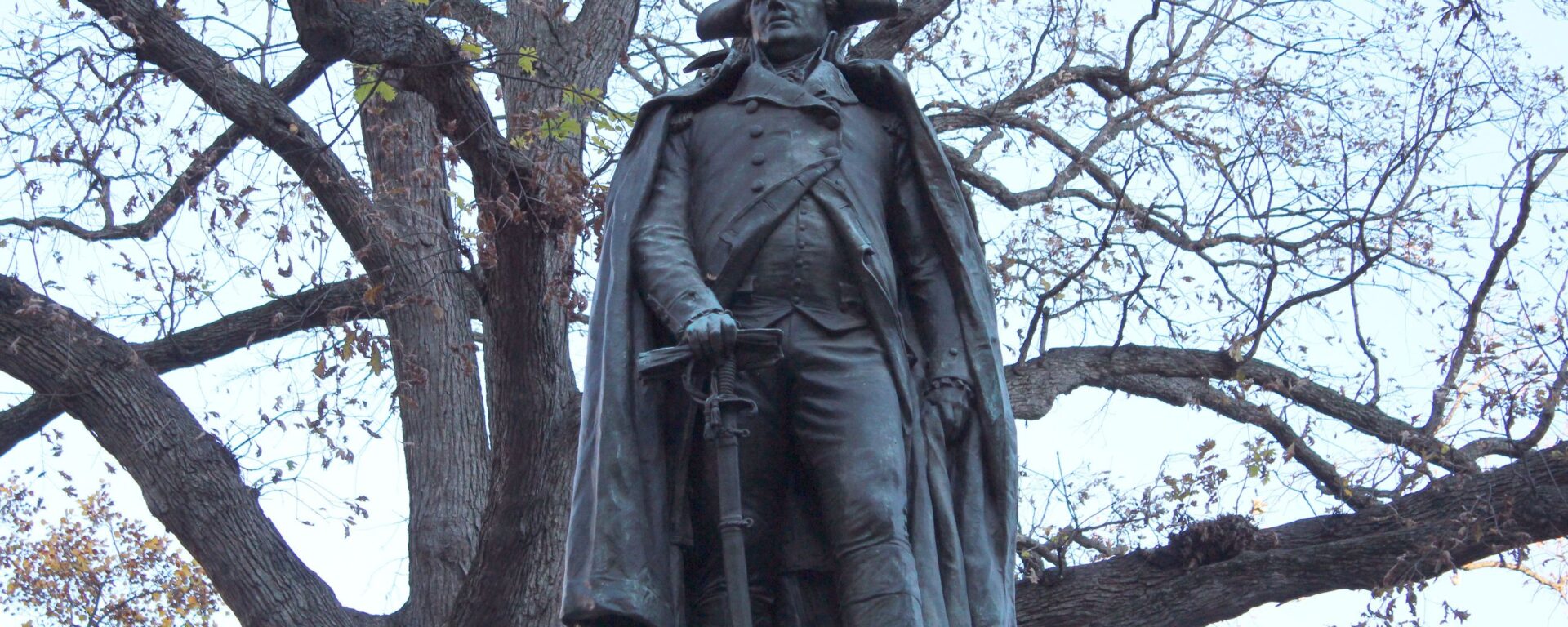“The Father of the American Navy”
Franklin Square, situated between K St, I St, 13th St, and 14th St, sees no end of vehicle or pedestrian traffic throughout the day. Food trucks line the eastern end of the park at lunch time while workers from the nearby office buildings enjoy lunch around the park’s broken fountain. On the western edge, overlooking 14th St’s never-ending stream of traffic, is the largely forgotten father of the United States Navy.

Standing 10 feet tall, the statue of Commodore Barry is mounted on an equally impressive granite base. The bronze statue stands as if on the deck of a ship, orders held in its right hand, which rests upon the hilt of a saber. On the front of the base, facing west is an allegorical figure of Victory standing on the prow of a ship, holding a laurel branch in its right hand and a sheathed sword in the left. The statue was sculpted by American artist John Boyle. The Barry statue is his most visible work in D.C., but he has statues of Sir Francis Bacon and Plato in the Library of Congress.

The statue was officially dedicated in May of 1914. President Woodrow Wilson spoke at the event at which thousands of spectators crowded Franklin Square and the surrounding roads. Because Barry was born in Ireland, Irish from around the country came to D.C. for the event, even going so far as to charter special trains to bring them there.
John Barry came to America when he was a teenager. As a Roman Catholic, he had come to Philadelphia seeking a better life and refuge from the persecution of Catholics in Ireland at the hands of the British. He was 30 when the American Revolution broke out and wasted no time dedicating himself to the American cause. Before the Declaration of Independence had been drafted he was in command of the USS Lexington. By April of 1776, he was the first to capture an armed British ship, the HMS Edward.

After capturing a number of other ships, command of the Lexington was given to someone else and he was to be given a new ship. The only problem was, the ship hadn’t been completed yet. Instead of waiting, Barry joined a company of Marines with whom he fought in the Battles of Trenton and Princeton. In 1777, Philadelphia was captured and his future ship was lost to the British. Not wanting to sit out a moment of the war, that winter he helped supply food and relief to Washington’s army at Valley Forge. The following spring he made a raid on the British ships in Philadelphia. With only 27 men and a few rowboats, he snuck alongside two British troop transports and completely overwhelmed them, capturing both boats and an armed schooner as well.

Throughout the war he set a standard of excellence that was matched only by his contemporary, John Paul Jones. In command of the USS Alliance, Barry took on two British ships and—after being badly wounded—managed to capture them both. Barry also fought and won the final naval battle of the American Revolution against the HMS Sybil off the coast of Cape Canaveral.
After the war and the signing of the Constitution, Washington commissioned Barry as the first naval officer of the United States. For the rest of his life he would be a living symbol of the U.S. Navy. He recommended the creation of the Department of the Navy separate from the Department of War. He also recommended the construction of multiple naval yards in the United States. He trained so many officers who fought with distinction during the War of 1812 that he was regarded as the “Father of the U.S. Navy.” He is little remembered today, but his name lives on in parks and schools across the country. His legacy is nothing less than the U.S. Navy.

Resources used for this article:
https://en.wikipedia.org/wiki/Commodore_John_Barry_(Boyle)
https://en.wikipedia.org/wiki/John_Barry_(naval_officer)
https://en.wikipedia.org/wiki/John_J._Boyle
http://www.ushistory.org/people/commodorebarry.htm
https://www.thenewamerican.com/culture/history/item/4774-john-barry-true-father-of-the-american-navy
